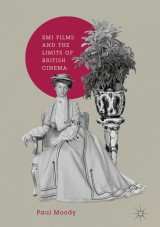Details

EMI Films and the Limits of British Cinema
|
85,59 € |
|
| Verlag: | Palgrave Macmillan |
| Format: | |
| Veröffentl.: | 19.10.2018 |
| ISBN/EAN: | 9783319948034 |
| Sprache: | englisch |
Dieses eBook enthält ein Wasserzeichen.
Beschreibungen
This book is the first of its kind to trace the development of one of the largest and most important companies in British cinema history, EMI Films. From 1969 to its eventual demise in 1986, EMI would produce many of the key works of seventies and eighties British cinema, ranging from popular family dramas like <i>The Railway Children</i> (Lionel Jeffries, 1970) through to critically acclaimed arthouse successes like <i>Britannia Hospital</i> (Lindsay Anderson, 1982). However, EMI’s role in these productions has been recorded only marginally, as footnotes in general histories of British cinema. The reasons for this critical neglect raise important questions about the processes involved in the creation of cultural canons and the definition of national culture. This book argues that EMI’s amorphous nature as a transnational film company has led to its omission from this history and makes it an ideal subject to explore the ‘limits’ of British cinema.
1. Introduction.- 2. And Soon the Darkness.- 3. Elstree Falling.- 4. Mr Forbes and the Pen-Pushers.- 5. All the Way Up.- 6. The Likely Lad.- 7. Trick or Treat?.- 8. American Adventure.- 9. Honky-Tonk Filmmaking.- 10. Memoirs of a Survivor.- 11. Conclusion.
<b>Paul Moody</b> is Senior Lecturer in Media and Communications at Brunel University London, UK.
This book is the first of its kind to trace the development of one of the largest and most important companies in British cinema history, EMI Films. From 1969 to its eventual demise in 1986, EMI would produce many of the key works of seventies and eighties British cinema, ranging from popular family dramas like <i>The Railway Children</i> (Lionel Jeffries, 1970) through to critically acclaimed arthouse successes like <i>Britannia Hospital</i> (Lindsay Anderson, 1982). However, EMI’s role in these productions has been recorded only marginally, as footnotes in general histories of British cinema. The reasons for this critical neglect raise important questions about the processes involved in the creation of cultural canons and the definition of national culture. This book argues that EMI’s amorphous nature as a transnational film company has led to its omission from this history and makes it an ideal subject to explore the ‘limits’ of British cinema.
Based on new archival material, never before used by researchers Revises our understanding of British culture in the 1970s and early 1980s Features new work on some of the most important films ever made, including The Go-Between, The Railway Children, Family Life, Villain, The Deer Hunter, and Britannia Hospital
“<i>EMI Films and the Limits of British Cinema</i> fills a clear gap in the existing literature on British cinema and offers a compelling analysis of a really tricky period of British film and cultural history. The period is characterised by fragmentation and contradictory currents which are difficult to map; Paul Moody has admirably succeeded in making sense of a complex historical moment, while still conveying the somewhat chaotic nature of the events under examination.” (Robert Shail, Leeds Beckett University, UK)<p> </p>

















